Set Up Search Dictionaries
Learning Objectives
After completing this unit, you’ll be able to:
- List three standard search features in Salesforce B2C Commerce.
- List the five standard search dictionaries.
- Describe three ways B2C Commerce can sort search results.
- List the three general steps you must take to configure Search Dictionaries.
Introduction
Brandon Wilson is a merchandiser at Cloud Kicks, a company that specializes in high-end custom sneakers. The Cloud Kicks B2C Commerce storefront is attracting lots of attention and sales are great. But Brandon wants to ramp up search capabilities to improve the shopper experience and drive sales even further. He can do that with Commerce Cloud Einstein.

In this unit, Brandon reviews the great B2C Commerce search features that Cloud Kicks currently uses. Then he explores how Commerce Cloud Einstein can push those features into overdrive.
B2C Commerce Storefront Search
B2C Commerce comes out-of-the-box with:
-
Keyword Search: The shopper enters a search term and the results display on the storefront (1).
-
Search Suggestions: As the shopper types, the storefront displays a list of possible results. At the same time, the software tries to complete the search term and automatically corrects spelling (2).
-
Search Results Sorting: Shoppers select how they want their results to sort (3).
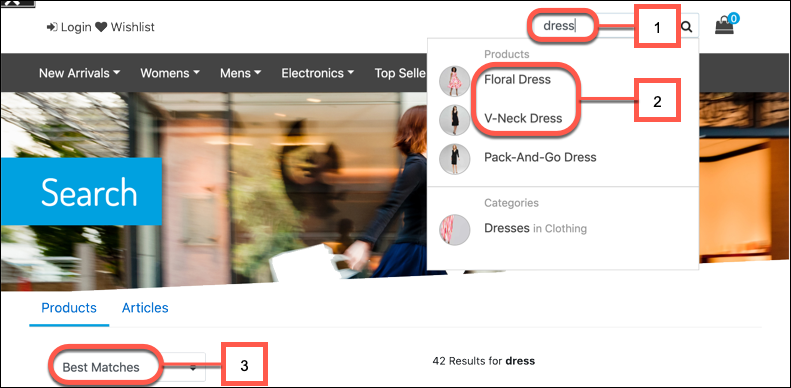
What Are Search Dictionaries?
B2C Commerce uses search dictionaries to provide search results. The better Brandon’s search dictionaries are, the more likely his shoppers can find what they’re looking for in their search results. Dictionaries include:
-
Synonyms: Words that mean the same thing.
-
Hypernyms: Term for a group of products. For example, the word top is a hypernym that contains the hyponyms tunic, shirt, and blouse. When a shopper searches for top, B2C Commerce returns products that contain top, tunic, shirt, and blouse.
-
Hyponyms: Term for an item in the group of products that a hypernym describes. For example, blouse is a hyponym of the hypernym top. When the shopper searches for blouse, B2C Commerce only returns products that contain blouse.
-
Common phrases: Word combinations that B2C Commerce must find together.
-
Compound words: Words that B2C Commerce splits into separate terms, based on a configuration rule that you set. For example, if you configure foot-*, a search for footstool returns results for foot and stool.
-
Stop words: Words that B2C Commerce ignores, such as an or the. Stop words keep the index more compact so results display faster.
After B2C Commerce checks its dictionaries, it sorts the results on the storefront. B2C Commerce sorts results based on the merchant or shopper-driven sorting rules that you configure in Business Manager.
How Einstein Adds Value
Brandon investigates how Commerce Cloud Einstein ramps up the results of each these search features.
Feature |
Standard B2C Commerce |
Commerce Cloud Einstein |
Einstein Feature |
|---|---|---|---|
Keyword Search |
Dictionaries that you manually create based on your own specific data |
Data that Einstein pulls from live searches and search results from many merchants and adds to existing dictionaries |
Search Dictionaries |
Search Suggestions |
Basic search-as-you-type with advanced features: spelling correction and search term completion |
Algorithms that add:
|
Search Recommendations |
Search Results |
Configured search result settings for:
|
As Commerce Cloud Einstein collects data, Predictive Sort learns about each shopper and increases the personalized sorting experience for them. This feature also enhances search results and suggestions. |
Predictive Sort |
Keyword Search
Shoppers want to find what they’re looking for now or they look elsewhere. With standard B2C Commerce keyword search, Brandon creates his search dictionaries manually. For example, he adds the term “high-top sneaker” to his list of compound words. Creating dictionaries this way is a manual effort that requires a deep understanding of his products and the locales he sells to.
Einstein Search Dictionaries pulls data automatically from live searches and search results from many merchants. It automatically detects relationships between search terms, and adds this data to existing dictionaries. No manual effort is involved!
Search Recommendations
Search recommendations begin as soon as a shopper starts typing into the search field. B2C Commerce comes with a basic search-as-you-type feature. Brandon can add automatic spell-correction and search term completion using Business Manager settings.
Einstein Search Recommendations applies algorithms to B2C Commerce data to identify the most relevant search results per shopper, even before the shopper types all the text. Using various data points, Einstein identifies recent user search phrases, popular and trending search phrases, and personalized auto-correction and term-completion.
Brandon’s shoppers can explore his site on the quickest path to conversion.
Search Results Sorting
Brandon uses Business Manager to configure how he wants B2C Commerce to sort search results. He can display a dropdown so shoppers can sort the results themselves, and he can perform behind-the-scenes sorting to promote certain types of products for:
- Keyword searches
- Category navigation
- Dynamic attributes, such as availability, or configured keyword groups
With Einstein Predictive Sort, Brandon can deliver more tailored and relevant search results by incorporating multiple data points from:
- Catalogs and products
- Order history
Based on a shopper's behavior and affinity to products, Einstein saves a cookie on the shopper’s device that includes the shopper’s assignment to specific products. This assignment can change within a session and works for registered and unknown shoppers. As Einstein collects data, Predictive Sort learns about each shopper and increases the personalization of search results sorting. Predictive Sort works with every type of behind-the-scenes sorting.
Now that Brandon understands how Einstein can make his storefront search even smarter, he's eager to deploy the features. He tackles Einstein Search Dictionaries first.
Search Dictionaries
To start with, the search dictionaries, enabled by default in B2C Commerce, uses only the site’s data. Once Brandon accepts the Einstein Data Privacy Agreement, he has access to community data and his search dictionaries are combined with data from the other contributing B2C Commerce merchants.
When enabled, Einstein Search Dictionaries consumes all site searches and search-related settings and identifies terms that shoppers search for but that are not in a dictionary. Using artificial intelligence (AI), it automatically detects relationships between search terms, recommends which synonym list to assign them to, and then creates new recommendations.
With Einstein Search Dictionaries, Brandon can:
- View new Einstein Search Dictionaries recommendations.
- Accept or reject suggestions.
- Blocklist specific terms.
- Create new dictionary word stems with the Stemming Exceptions option.
Configure Search Dictionaries
To get the full benefit of Einstein Search Dictionaries, Cloud Kicks must share data with other merchants. That’s where the Einstein Data Privacy Agreement comes in. Linda Rosenberg, the Cloud Kicks’ administrator, must accept the terms and conditions of the Einstein Data Privacy Agreement on her staging instance, so Brandon can get started.
In this module, we assume you are a B2C Commerce merchandiser with the proper permissions to perform these tasks. If you’re not a B2C Commerce merchandiser, that’s OK. Read along to learn how your merchandiser would take these steps in a staging instance. Don't try to follow our steps in your Trailhead Playground. B2C Commerce isn't available in the Trailhead Playground. If you have a staging instance of B2C Commerce, you can try out these steps in your instance. If you don't have a staging instance, ask your manager if there is one that you can use.
With the privacy agreement, Linda gives her company’s consent to contributing its search dictionary data to a shared database. This provides recommendations to other merchants who’ve also consented to contribute to the shared database. Salesforce represents and warrants that it does not disclose a merchant’s search dictionary data to any other customer in identifiable form.
Linda further acknowledges that Salesforce can access her company’s search dictionary data submitted to B2C Commerce for training and to improve the Einstein Search Dictionary and any other current or future similar or related features, products, or services.
Let’s see how Linda gives consent in just a few clicks.
To access Business Manager, you must have a B2C Commerce implementation. In this module, we assume you are a B2C Commerce administrator or merchandiser with the proper permissions to perform these tasks. If you’re not a B2C Commerce administrator or merchandiser, that’s OK. Read along to learn how your administrator would take these steps in a staging instance. Don't try to follow our steps in your Trailhead Playground. B2C Commerce isn't available in the Trailhead Playground. If you have a staging instance of B2C Commerce, you can try out these steps in your instance. If you don't have a staging instance, ask your manager if there is one that you can use.
Here’s how to contribute search dictionary data to the shared database.
- In Business Manager, click App Launcher and select Administration | Global Preferences | Einstein Search Dictionaries Opt-In.
- Select I accept these terms and conditions.
- Click Save.
Here’s how Brandon configures Search Dictionaries.
Add the email addresses of people who plan to manage synonyms.
- In Business Manager, click App Launcher and select Merchant Tools | Site | Site Preferences | Search Preferences.
- Select Notification Settings for Search Dictionary.
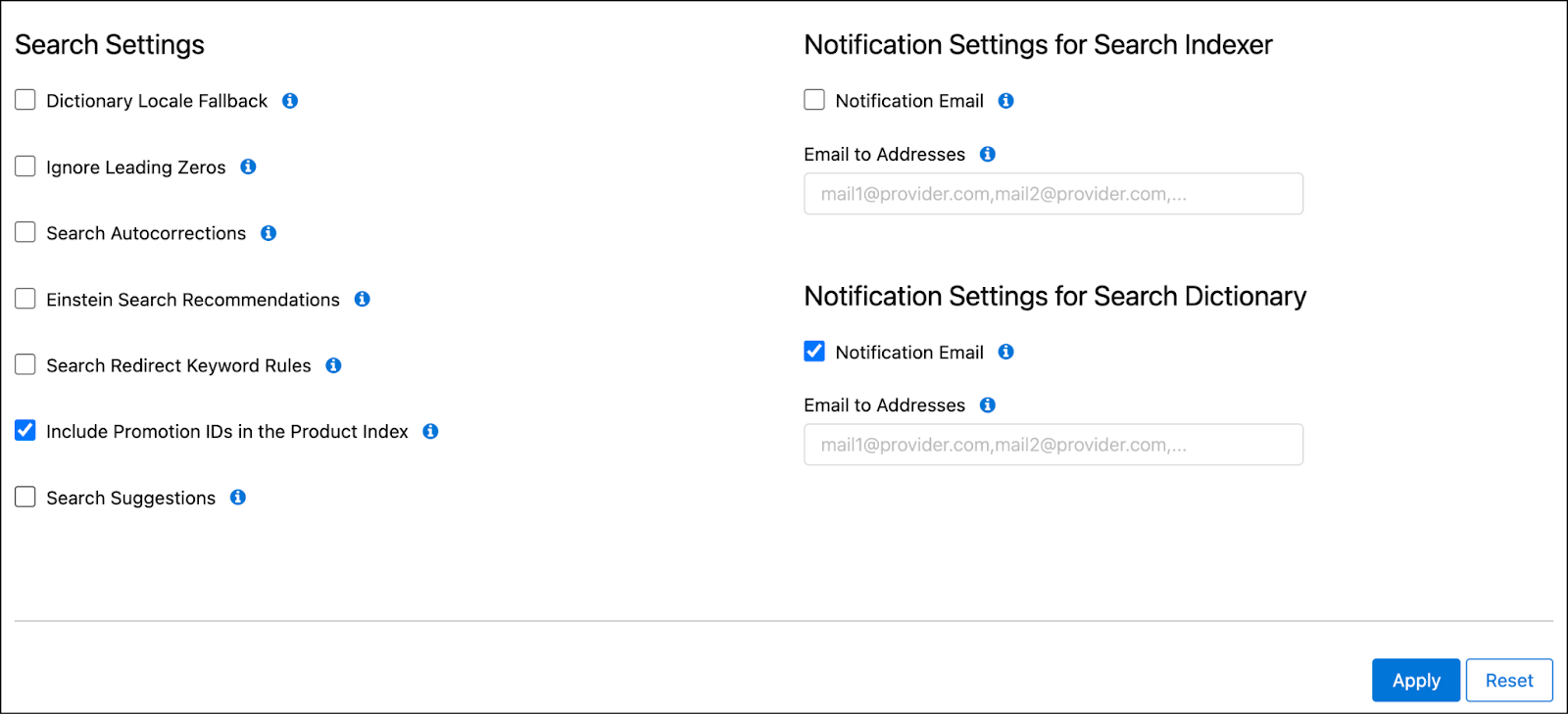
- Add the emails.
- Click Apply.
If the site has multiple locales:
- In Business Manager, click App Launcher and select Merchant Tools | Site | Site Preferences | Search Preferences.
- Select Search Settings.
- Select Dictionary Locale Fallback to allow language level settings to update the regions.
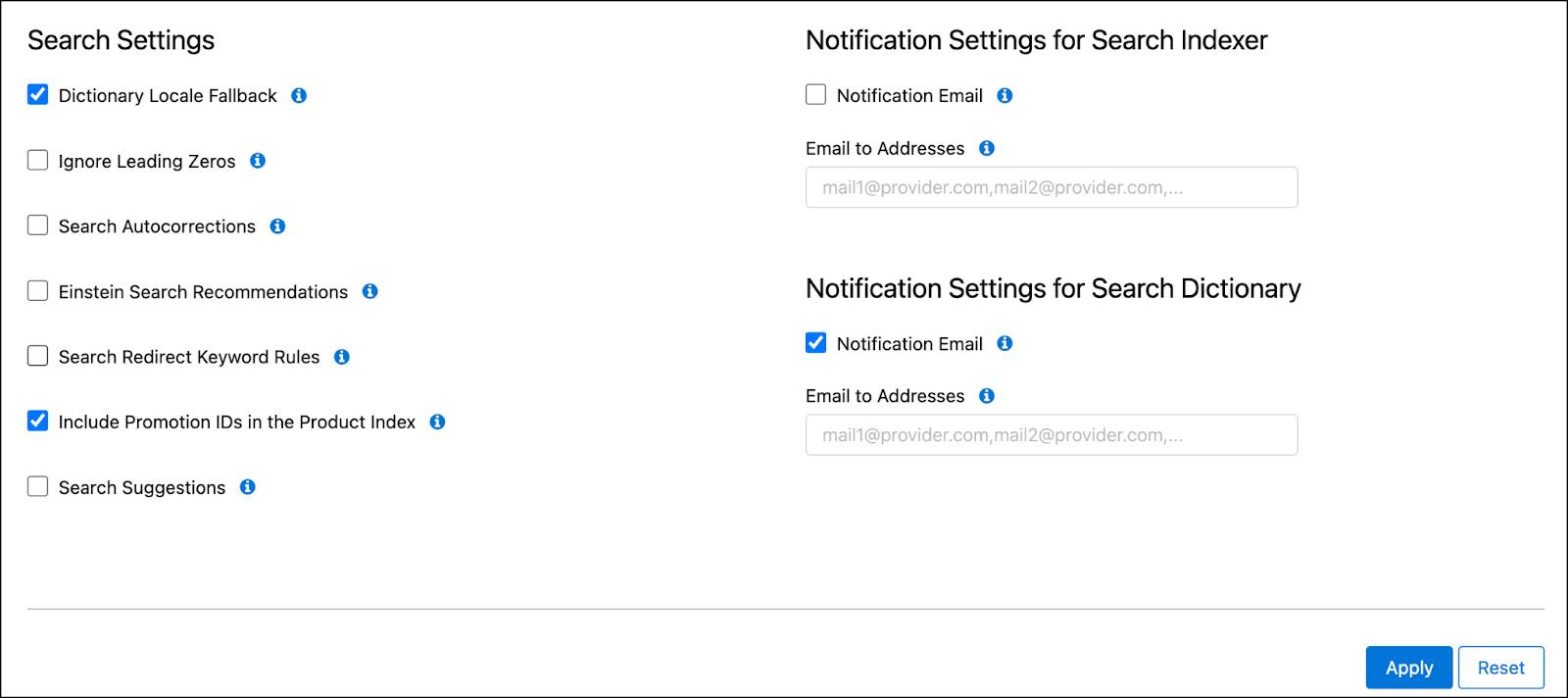
Rebuild the search index.
- In Business Manager, click App Launcher and select Merchant Tools | Site | Search | Search Indexes.
- Select the checkbox for the relevant indexes.
- Click Rebuild.
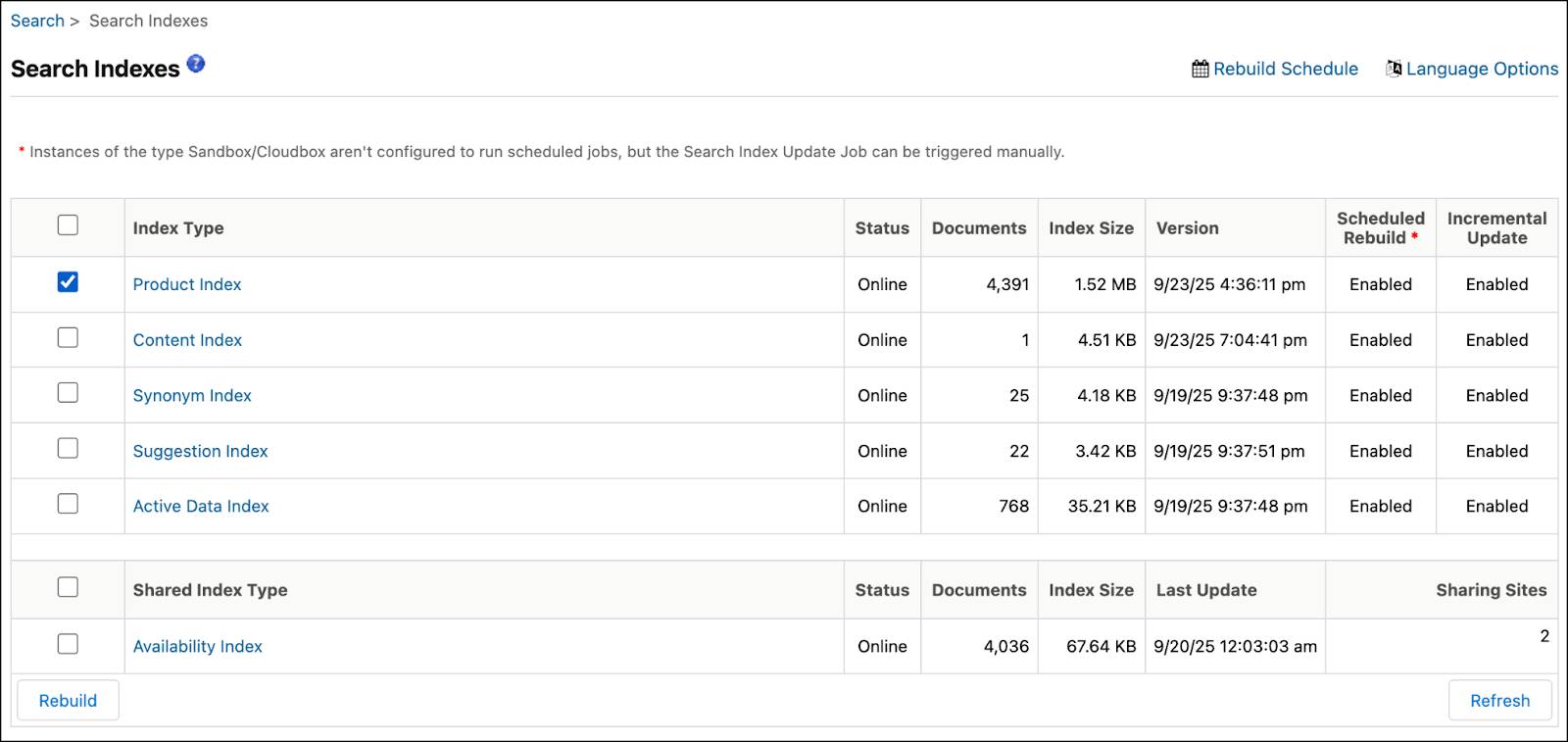
Here’s how he uses Search Dictionaries.
- In Business Manager, click App Launcher and select Merchant Tools | Site | Search Dictionaries.
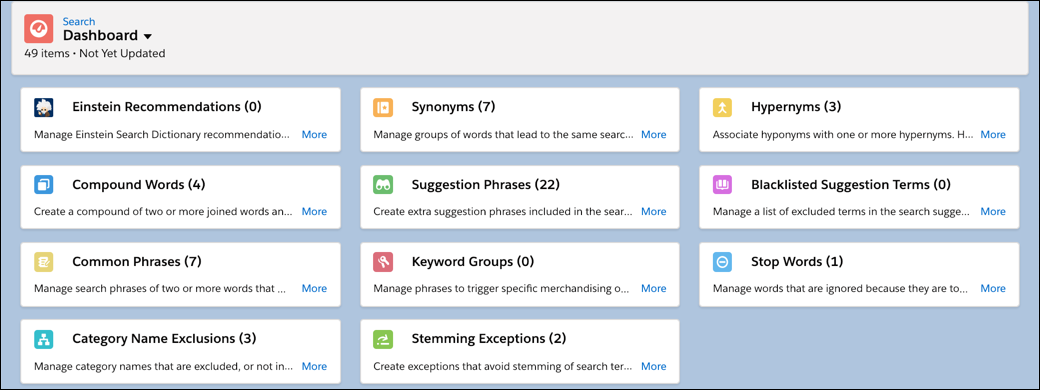
- Click or select a dictionary type, for example, Compound Words.
- Click New to create a new dictionary entry.
Required fields are indicated by a red dot. The type is already selected: Compound Word.
- Select the locale.
- Enter the dictionary entry as a value: high-top.
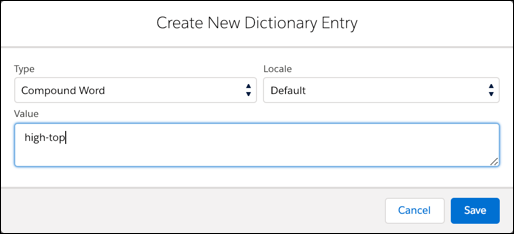
- Click Save.
To edit an entry you can search or filter to find it.
- Click Search Dictionary to search for an entry across dictionaries.

- You can filter the search by type and locale. If no filters are applied, search includes all dictionaries.
- Click the filter icon to add a new filter.
- Click Add Filter.
- Select a field and a value.
- Click Apply.
- Click Add Filter.
- Click Edit List Filters to edit an existing filter.
Stemming Exceptions
Next, let’s see how easy it is to create new stems using stemming exceptions.
- Open Business Manager.
- Select site > Merchant Tools > Search > Search Dictionaries.
- Click Stemming Exceptions.
- Click New.
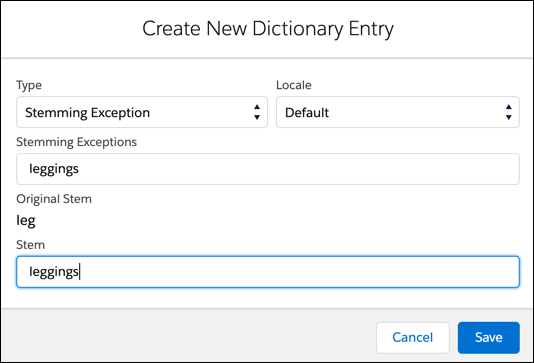
- Enter leggings as the exception and leggings as the stem.
- Click Save.
To push these changes to the production instance, Brandon asks Linda to replicate from development to the staging instance for testing, and then from staging to production.
Next Steps
Brandon learned how Commerce Cloud Einstein can make search smarter on his B2C Commerce storefront. He explored Search Dictionaries and learned how to configure and use Search Dictionaries to improve shopper search results. Next, he implements Commerce Cloud Einstein Search Recommendations.